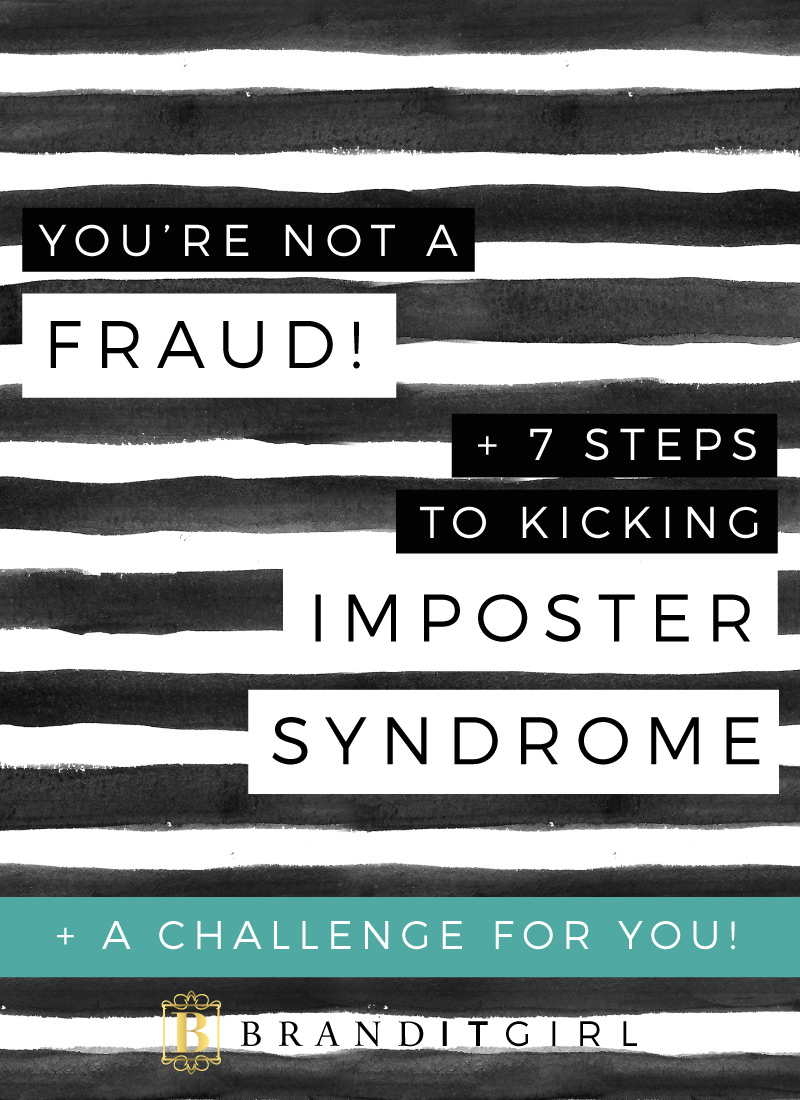
So you are an imposter hey? Let me guess:
"You don't have a clue what you are talking about"
"Who are you to teach other people about this?"
"That was just a fluke, don't let yourself think that it will happen again!"
Any of those self-talk statements sound familiar? I am sure they do and it's called Imposter Syndrome. It's that feeling that you don't know what you are doing; that you couldn't possibly be qualified enough for the job at hand (regardless of how qualified you actually are!); that any successes that you do have are a fluke, a mistake or happened 'by luck'. It's that little niggling voice in the back of your mind that tells you to stop what you are doing because "let's be honest, you are a fraud".
My darling love bug, you are not alone.
It's an IT Girls job to be confident, secure and in control, right? Sorry to disappoint, but I am human too and let me tell you something: Imposter Syndrome is an actual thing and it effects effect hundreds of thousands of people! A study in the 1980s estimated that two out of five successful people actually identified themselves as being a fraud. That is a huge figure and today, with the rise of technology, it's only increasing! Other studies conducted found that 70% of all people feel like impostors so when you start to look at those kinds of figures you realise that all those feelings of inadequacy and fraudulence doesn't make you weird - it makes you a member of a pretty large group of people! Let's look at what Imposter Syndrome actually is!
IMPOSTER SYNDROME
Imposter Syndrome was identified by clinical psychologists Dr. Pauline R. Clance and Suzanne A. Imes in 1978. This issues occurs when high-achieving people have a continual and persistent fear of being exposed as a 'fraud' regardless of the evidence that they are in fact the real deal! These individuals think that they do not deserve the success they experience and will often attribute it to 'luck', 'deception', 'good timing' or even 'magic' and 'divine intervention'. There is also evident that suggests that Imposter Syndrome is particularly common in women and so, being lady bosses, we need to shine a light on this and move forward together as a community!
The really weird thing about this problem is that it is most prevalent among high-achievers. Even some of the most influential women that so many of us look up to get attacks of Imposter Syndrome. Need proof? Actress and UN Ambassador Emma Watson on numerous occasions has said that she feels like an imposter (read an interview with her here) and she is not the only one! Seth Godin wrote in 'The Icarus Deception' that even he still feels like a fraud despite all the incredible work he does and the books he has published. You can also read this great article full of celebrities that struggle with this!
WHAT MIGHT IMPOSTER SYNDROME LOOK LIKE ON YOU?
FEELING LIKE A FAKE | You might be shying away from potential clients, finding yourself essentially talking them out of engaging your services or buying your product for fear that you will not be able to deliver what they are expecting - regardless of your skill level and/or product quality. You might also find yourself saying to family and friends that you can't believe a new achievement and it was just a fluke: "I have everyone fooled! What if they realise that I am not what they think I am!?".
NOT CHARGING ENOUGH | This could be seriously hurting your business! It's when you don't believe that what you have to offer is worth as much as it really is! You might discount products and services because you don't think anyone will pay what market value, or you can't identify the worth of the work because you don't believe you know enough or have enough skill to justify it!
PARALYSIS | You sit down at your desk, ready to go and you can't function. Like there is nothing but scramble. You can't focus on any one task, you can't finish any projects, your to-do list is never any shorter and you are completely and utterly paralysed.
SO WHY ARE YOU QUESTIONING YOUR AWESOMENESS?
There are a variety of reasons that you might suffer from Imposter Syndrome, or perhaps you just have elements of feeling like an Imposter. Attitudes and beliefs of others - we are endlessly impacted by the messages that we receive from others, be it direct or indirect.
Our parents and partners have a huge impact on our sense of self worth. Often feelings of imposition and fraudulence can come from family situations and dynamics. If the aspirations of an individual conflict with family expectations it may result in imposter feelings. For instance, if a young woman wants to become a mechanic, she may be met with resistance by her family based on their expectations of gender and this can deeply impact self-worth. Family labels can also have an impact: for instance some families label one child as the 'intelligent' one while the other is the 'sporty' one for instance. This may result in the 'sporty' child to grow up believing they are not intelligent, regardless of their great academic achievements in later years.
Partners and significant others also have an equal impact on the development of Imposter Syndrome. Being undermined in a relationship, being told you wouldn't understand or repeatedly being told that you can't do something will also harbour self-limiting beliefs. While a vast majority of the research points to external factors impacting on the development of Imposter Syndrome, it doesn't mean that we can bury our heads in the sand and just accept it!
HOW TO KICK THE IMPOSTER MINDSET
While I still haven't found a way to kick it entirely, (and I do wonder if these thoughts ever really go away once you get them) there are definitely things you can do to minimise the hold that it has on you!
- BECOME AWARE | It sounds really simple, but honestly, becoming aware of your self-limiting beliefs, thoughts and imposter tendencies will really help you to monitor the control that these feelings are having on you. Acknowledge that they exist and make a conscious decision that they won't be controlling you today!
- SUPPORT | Being able to verbalise your feelings of being a fraud is really important. That person can help you to dispel feelings that you are somehow less that the magnificent creature you are. It might be a friend, family member or even a professional such as a councillor. There are so many incredible Facebook communities out there of women just like you that feel the same! Check out the Brand IT Girls Connected community - feel free to post your struggles and we will pull it apart with you!
- REFRAME FAILURE | Seeing failure as an opportunity to learn and grow rather than as a big fat stupid you mistake is really important. Train yourself to use the phrase: "It didn't work out, but here's what I learnt...". Mistakes don't make you - it's what you do after than impacts who you really are. So reframe the notion of making a mistake from something that is soul crushing to being an opportunity for growth and development.
- WRITE IT DOWN | Keep a journal of everything you DO succeed at and all the great achievements you have. Reading back over the incredible triumphs you have had will help to rewire this self-limiting mindset. Nesha at Nesha Designs calls this a success log, and I absolutely LOVE that idea. She recommends writing it down every time you reach a milestone or have a great win personally and for your business.
- DISCREDIT | When you feel that self doubt creeping in, write it down too and then reflect back on all the positive things and discredit the imposter feelings by listing why it can't possibly be the case! Listing everything that you are good at and why is a great way to discredit these thoughts and often by the time I get halfway through that list, I have forgotten what I was initially feeling like a fraud over!
- DRESS THE PART | Dress, talk and walk the part that you want to play. This is a controversial one, but I truly believe that when you dress the part, you feel a particular way and this will have an impact on your perception of self! Sarah over at Career Contessa talks about this saying that if you act confident enough you will start believing that you are!
- VISUALISATION | This is something I am practicing more and more - I will visualise myself being confident, succeeding and achieving the things I want to achieve. I write this down because it is proven that writing it down gives the visualisation more power. Write down exactly what you want and what you want to feel in as much detail as you can!
MY CHALLENGE TO YOU
Try one of these 7 Imposter Syndrome mindset shifters each day for a week. Put all your focus into each specific mindset shifter each day and see the difference you experience after a week! Head over to the Brand IT Girls Connected community and share your experiences each day. I will be there to help you along the way!



